| Listing 1 - 10 of 36 | << page >> |
Sort by
|
Book
ISBN: 081476049X 9780814760499 9780814763476 0814763472 Year: 2015 Publisher: New York, NY : New York University Press,
Abstract | Keywords | Export | Availability | Bookmark
 Loading...
Loading...Choose an application
- Reference Manager
- EndNote
- RefWorks (Direct export to RefWorks)
A comparative history of cross-cultural encounters and the critical role of cannibalism in the early modern period Cannibalism, for medieval and early modern Europeans, was synonymous with savagery. Humans who ate other humans, they believed, were little better than animals. The European colonizers who encountered Native Americans described them as cannibals as a matter of course, and they wrote extensively about the lurid cannibal rituals they claim to have witnessed. In this definitive analysis, Kelly L. Watson argues that the persistent rumors of cannibalism surrounding Native Americans served a specific and practical purpose for European settlers. These colonizers had to forge new identities for themselves in the Americas and find ways to not only subdue but also co-exist with native peoples. They established hierarchical categories of European superiority and Indian inferiority upon which imperial power in the Americas was predicated. In her close read of letters, travel accounts, artistic renderings, and other descriptions of cannibals and cannibalism, Watson focuses on how gender, race, and imperial power intersect within the figure of the cannibal. Watson reads cannibalism as a part of a dominant European binary in which civilization is rendered as male and savagery is seen as female, and she argues that as Europeans came to dominate the New World, they continually rewrote the cannibal narrative to allow for a story in which the savage, effeminate, cannibalistic natives were overwhelmed by the force of virile European masculinity. Original and historically grounded, Insatiable Appetites uses the discourse of cannibalism to uncover the ways in which difference is understood in the West.
Cannibalism --- Anthropophagy --- Ethnology
Book
ISBN: 2847290192 Year: 2005 Volume: *2
Abstract | Keywords | Export | Availability | Bookmark
 Loading...
Loading...Choose an application
- Reference Manager
- EndNote
- RefWorks (Direct export to RefWorks)
J. : Donc, cannibale c'est celui qui se nourrit de l'autre de sa même espèce, alors qu'anthropophage est celui qui mange des hommes, que ce soit un porc ou un autre homme, dans ce dernier cas, lui-même, en plus, cannibale... L. : Oui, c'est exact. Ce qui est curieux, c'est que manger l'autre est devenu très tôt, du fait même qu'il désignait plus un imaginaire qu'un phénomène attesté, métaphorique, et ainsi au XVIIIe siècle on utilisait anthropophage pour désigner un " exploiteur " voire un " bourreau " du temps de la Révolution française... J. : C'est donc dans le sens d " exploiteur " que le capitaine Haddock le reprend comme terme d'injure dans sa liste interminable d'insultes, entre " canaque " et " catachrèse " L. : Oui, c'est vrai... Ce qui est étonnant et qui fait partie de la magie de la langue, c'est que le chien est depuis toujours dans l'imaginaire humain un mangeur d'hommes, et qu'on peut faire une étymologie fantaisiste et arriver à cannibale, l'animal canin qui mange des hommes ; et s'il s'agit d'un homme, du fait même de dévorer de la chair humaine, il devient lui-même cannibale, c'est-à-dire chien, animal, bête... J. : En tout cas, alors que par " anthropophagie " on comprend une coutume alimentaire associée aux tribus et autres sociétés humaines primitives, le terme " cannibale " renvoie dans l'imaginaire populaire à, comme dirait Pierre Chaunu, " un bel appétit ". L. : Et à une culture, à une tradition faite de dieux et d'hommes " notables " qui ont pratiqué le cannibalisme, et qui constituent une véritable lignée cannibalesque, des origines à nos jours. Et ce, en Occident, chez nous, en Europe, pas ailleurs, pas chez les autres...
Anthropophagy --- Cannibalism --- Cannibalisme --- Kannibalisme --- Cannibalism.
Book
ISBN: 0195025067 Year: 1979 Publisher: New York (N.Y.): Oxford university press
Abstract | Keywords | Export | Availability | Bookmark
 Loading...
Loading...Choose an application
- Reference Manager
- EndNote
- RefWorks (Direct export to RefWorks)
Cannibalism --- Cannibalisme --- Anthropophagy --- Ethnology --- Cannibalism.
Book
ISBN: 1283168960 9786613168962 1400833205 9781400833207 9780691133270 0691133271 9780691152196 0691152195 Year: 2009 Publisher: Princeton Princeton University Press
Abstract | Keywords | Export | Availability | Bookmark
 Loading...
Loading...Choose an application
- Reference Manager
- EndNote
- RefWorks (Direct export to RefWorks)
The cannibal has played a surprisingly important role in the history of thought--perhaps the ultimate symbol of savagery and degradation-- haunting the Western imagination since before the Age of Discovery, when Europeans first encountered genuine cannibals and related horrible stories of shipwrecked travelers eating each other. An Intellectual History of Cannibalism is the first book to systematically examine the role of the cannibal in the arguments of philosophers, from the classical period to modern disputes about such wide-ranging issues as vegetarianism and the right to private property. Catalin Avramescu shows how the cannibal is, before anything else, a theoretical creature, one whose fate sheds light on the decline of theories of natural law, the emergence of modernity, and contemporary notions about good and evil. This provocative history of ideas traces the cannibal's appearance throughout Western thought, first as a creature springing from the menagerie of natural law, later as a diabolical retort to theological dogmas about the resurrection of the body, and finally to present-day social, ethical, and political debates in which the cannibal is viewed through the lens of anthropology or invoked in the service of moral relativism. Ultimately, An Intellectual History of Cannibalism is the story of the birth of modernity and of the philosophies of culture that arose in the wake of the Enlightenment. It is a book that lays bare the darker fears and impulses that course through the Western intellectual tradition.
Cannibalism --- Anthropophagy --- Ethnology --- History. --- Philosophy.
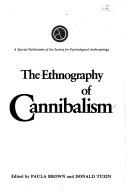
ISBN: 0913077003 Year: 1983 Publisher: Washington (D.C.) Society for psychological anthropology
Abstract | Keywords | Export | Availability | Bookmark
 Loading...
Loading...Choose an application
- Reference Manager
- EndNote
- RefWorks (Direct export to RefWorks)
Cannibalism --- Cannibalisme --- Congresses --- Congrès --- Congresses. --- Congrès --- Anthropophagy --- Ethnology
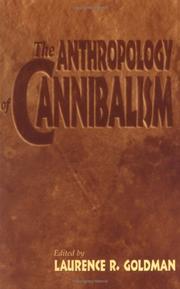
ISBN: 0897895975 9780897895972 9780897895965 0897895967 Year: 1999 Publisher: Westport (Connect.) London Bergin and Garvey
Abstract | Keywords | Export | Availability | Bookmark
 Loading...
Loading...Choose an application
- Reference Manager
- EndNote
- RefWorks (Direct export to RefWorks)
Anthropophagy --- Cannibalism --- Cannibalisme --- Kannibalisme --- Ethnology --- Anthropologie sociale et culturelle --- Methodology --- Méthodologie --- Méthodologie
Book
ISBN: 9789956550739 9956550736 9956550965 9789956550968 Year: 2018 Publisher: Baltimore, Maryland : Baltimore, Md. : Project Muse, Project MUSE,
Abstract | Keywords | Export | Availability | Bookmark
 Loading...
Loading...Choose an application
- Reference Manager
- EndNote
- RefWorks (Direct export to RefWorks)
This innovative book is an open invitation to a rich and copious meal of imagination, senses and desires. It argues that cannibalism is practised by all and sundry. In love or in hate, fear or fascination, purposefulness or indifference, individuals, cultures and societies are actively cannibalising and being cannibalised. The underlying message of: 'Own up to your own cannibalism!' is convincingly argued and richly substantiated. The book brilliantly and controversially puts cannibalism at the heart of the self-assured biomedicine, globalising consumerism and voyeuristic social media. It unveils a vast number of prejudices, blind spots and shameful othering. It calls on the reader to consider a morality and an ethics that are carefully negotiated with required sensibility and sensitivity to the fact that no one and no people have the monopoly of cannibalisation and of creative improvisation in the game of cannibalism. The productive, transformative and (re)inventive understanding of cannibalism argued in the book should bring to the fore one of the most vital aspects of what it means to be human in a dynamic world of myriad interconnections and enchantments. To nourish and cherish such a productive form of cannibalism requires not only a compassionate generosity to let in and accommodate the stranger knocking at the door, but also, and more importantly, a deliberate effort to reach in, identify, contemplate, understand, embrace and become intimate with the stranger within us, individuals and societies alike.
Consumption (Economics) --- Cannibalism --- Anthropophagy --- Ethnology --- Consumer demand --- Consumer spending --- Consumerism --- Spending, Consumer --- Demand (Economic theory)
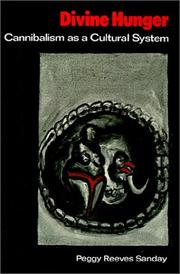
ISBN: 0521311144 052132226X 1316041034 0511607792 9780511607790 Year: 1986 Publisher: Cambridge
Abstract | Keywords | Export | Availability | Bookmark
 Loading...
Loading...Choose an application
- Reference Manager
- EndNote
- RefWorks (Direct export to RefWorks)
The practice of cannibalism is in certain cultures rejected as evil, while in others it plays a central part in the ritual order. Anthropologists have offered various explanations for the existence of cannibalism, none of which, Peggy Sanday claims, is adequate. In this book she presents a new approach to understanding the phenomenon. Through a detailed examination of ritual cannibalism in selected tribal societies, and a comparison of those cases with others in which the practice is absent, she shows that cannibalism is closely linked to people's orientation to the world, and that it serves as a concrete device for distinguishing the 'cultural self' from the 'natural other'. Combining perspectives drawn from the work of Ricoeur, Freud, Hegel, and Jung and from symbolic anthropology, Sanday argues that ritual cannibalism is intimately connected both with the constructs by which the origin and continuity of life are understood and assured from one generation to the next and with the way in which that understanding is used to control the vital forces considered necessary for the cannibalism in a culture derives from basic human attitudes toward life and death, combined with the realities of the material world. As well as making an original contribution to the understanding of the significant human practice, Sanday also develops a theoretical argument of wider relevance to anthropologists, sociologists, and other readers interested in the function and meaning of cannibalism.
Ethnology. Cultural anthropology --- Cannibalism --- Cross-cultural studies. --- Cross-cultural studies --- Cannibalism - Cross-cultural studies. --- Anthropophagy --- Ethnology --- Social Sciences --- Anthropology
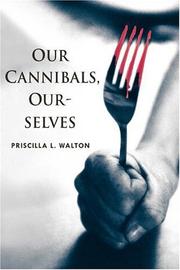
ISBN: 1283609185 9786613921635 0252092783 9780252092787 0252029259 9781283609180 9780252029257 6613921637 Year: 2004 Publisher: Urbana : University of Illinois Press,
Abstract | Keywords | Export | Availability | Bookmark
 Loading...
Loading...Choose an application
- Reference Manager
- EndNote
- RefWorks (Direct export to RefWorks)
Popular culture. --- Cannibalism. --- Culture, Popular --- Mass culture --- Pop culture --- Popular arts --- Communication --- Intellectual life --- Mass society --- Recreation --- Culture --- Anthropophagy --- Ethnology
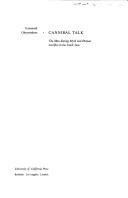
ISBN: 0520243072 0520243080 1417585110 1597345229 1282763156 9786612763151 0520938313 9780520938311 9780520243071 9780520243088 9781417585113 Year: 2005 Publisher: Berkeley, CA : University of California Press,
Abstract | Keywords | Export | Availability | Bookmark
 Loading...
Loading...Choose an application
- Reference Manager
- EndNote
- RefWorks (Direct export to RefWorks)
In this radical reexamination of the notion of cannibalism, Gananath Obeyesekere offers a fascinating and convincing argument that cannibalism is mostly "cannibal talk," a discourse on the Other engaged in by both indigenous peoples and colonial intruders that results in sometimes funny and sometimes deadly cultural misunderstandings. Turning his keen intelligence to Polynesian societies in the early periods of European contact and colonization, Obeyesekere deconstructs Western eyewitness accounts, carefully examining their origins and treating them as a species of fiction writing and seamen's yarns. Cannibalism is less a social or cultural fact than a mythic representation of European writing that reflects much more the realities of European societies and their fascination with the practice of cannibalism, he argues. And while very limited forms of cannibalism might have occurred in Polynesian societies, they were largely in connection with human sacrifice and carried out by a select community in well-defined sacramental rituals. Cannibal Talk considers how the colonial intrusion produced a complex self-fulfilling prophecy whereby the fantasy of cannibalism became a reality as natives on occasion began to eat both Europeans and their own enemies in acts of "conspicuous anthropophagy."
Cannibalism. --- Cannibalisme --- Cannibalism --- Anthropology --- Social Sciences --- Social & Cultural Anthropology --- Ethnology. --- Cultural anthropology --- Ethnography --- Races of man --- Social anthropology --- Anthropophagy --- Ethnology --- Human beings
| Listing 1 - 10 of 36 | << page >> |
Sort by
|

 Search
Search Feedback
Feedback About
About Help
Help News
News